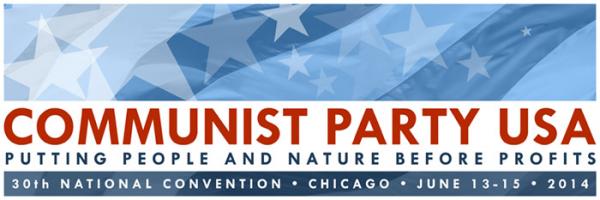
Submitted by Emile Schepers of Virginia
Dropping the phrase “Marxism Leninism”
I probably have never used the phrase Marxism-Leninism in 27 years in the Party. The reason is that I usually function in a mode that requires me to explain concepts in more detail, to fit specific situations and settings. When I explain Cuban socialism, depending on the context and whom I am addressing, I certainly explain its conceptual structure in terms of the ideas of Marx, Engels, Lenin and others.
Yet others, in our Party, in fraternal parties and in the world movement, use the term “Marxism-Leninism” in a constructive way, not, as suggested, as a gloss for “Stalinism”. What they mean is “the ideas of Marx (and Engels) and those of Lenin, together”.
So when some read that we want to drop the term “Marxism-Leninism” they suspect that there is something more behind it, that what is intended is to de-emphasize Lenin and his contributions. But almost all of us see Lenin as having contributed important ideas on imperialism, the state, party organization, the rights of minorities and women and many other things.
Unless the reasons for dropping “Marxism-Leninism” can be presented in a clearer way, this promises to create divisions within our party.
And at long last, we have to come to grips with the “Stalinism” issue.
Changing the name of the Party
I have the following problems with this proposal, not of which have anything to do with turning words and phrases into fetishes. They are all practical questions.
First, as expounded by Comrade Elena, there is not enough of a “why” presented. Just because we should not make a fetish of a word, or because we should not be tied down by old traditions, does not amount to a rational reason for changing the Party’s name.
Words, phrases and symbols are not, per se, matters of principle, but people are interconnected via the symbolic language which these things constitute, and that’s important for building and maintaining any organization. We are not creating something from scratch here, but building on excellent human materials already integrated into the CPUSA.
Some have an emotional involvement with the words, slogans and symbols. That is neither good nor bad, but is close to inevitable, given our mutual history of struggle and sacrifice. Many people in our party are likely to be offended if they think that things that have been so important to them being tossed aside lightly. Rational or not, this has to be taken into consideration.
Secondly, if the idea is that changing the name will reduce fear and repression, thereby leading to a surge in our membership, I think it is erroneous.
We face attacks not because of the word “communist” but because what we represent and what we fight for. If we change our name, the attacks will continue under the new name, which will immediately be turned into a swearword by our ruling class enemies. Within days, maybe hours, of our taking such a decision, there will be attacks circulating on the internet and social media informing the word that the new “Party X” is really the old CPUSA “in disguise”. So a name change will not faze our enemies, but might confuse and demoralize our friends. It will also make us look furtive, as if we are operating under false pretenses – camouflaged, as it were. This would feed into one of the important features of red-baiting, namely that communists are sneaky and underhanded.
There are many members of our Party, new or old, who have felt nervous about openly identifying themselves as communists. Sometimes this is reasonable nervousness (worries about losing one’s job or rejection by one’s family). At other times it is not. Many comrades report that when they have told people they are communists, they get a surprisingly positive reaction, and the negative reactions are seldom as bad as they feared. This has been my experience too. It is an experience which helps our political development as individuals. It builds our courage and makes us stronger.
We should remember that almost everybody now in the party joined under the old name. Many of our new members came into the party after contacting us online, recently perhaps by doing an internet search under our current name or some variant of it. Changing the name will make it harder to find us in this way, besides creating confusion about who, exactly, the new entity is. Those who are not in a position to openly declare themselves to be communists don’t have to (this has never been a problem for us), and work with non-communist groups and tendencies can be carried out under a wide variety of united front structures with their own names.
In my experience in a wide variety of mass struggles, I have come to the conclusion that there are tens of thousands and perhaps hundreds of thousands of excellent people, workers and others, in this country who would fit right into our party in its present configuration. But I don’t think the name is what has limited our growth. I think it is a lack of resources to do adequate outreach and also lingering sectarian tendencies that cause some of us to hesitate to engage with others involved in the myriad struggles. In some clubs, in my experience, there has not been a push to get out there, talk to people and work systematically to bring them closer to our party. Those are the problems we need to overcome to grow even more than we have been doing.
And I like Erwin’s point about other left groups. There are many, and all but a few of them eschew the word “communist” in their names. Yet are they growing? Are they recruiting masses of people, both among the working class base and among the activists? If they are, I would be very surprised.
A final word: By clinging to the word “communist” in our self-identification we have been performing a major service for the U.S. working class by demystifying the “c-word”. Anti-communism and red baiting are weapons that have been used against the working class since the days of the Communist Manifesto, and by openly explaining to the entire world what being a communist means, we combat that.
Democratic Centralism
To me “democratic centralism” means that decisions are made democratically and collectively, but that members of the organization are expected to respect the majority decision and do what they can to implement it. The alternatives are:
-
Bureaucratic centralism, in which decisions are not made democratically but are imposed in a top-down way on the membership.
-
Anarchic liberalism, in which decisions are made democratically (perhaps) but nobody is bound by them, and everybody does what they please.
Compared to these two possibilities, democratic centralism still seems best. But if someone can find a way of expressing this that is more appealing to U.S. workers, I would be fine with it.
But in the age of the internet and social media, I don’t think there is a practical way of cutting off debate after the National Convention and only restarting it 3 months before the next National Convention. First off all, it won’t work; secondly, the world is changing so fast that stifling debate would do positive harm because of the information, perspectives and insights it would block.
Vanguard
When Lenin and his Bolshevik colleagues conceptualized the idea of their party as the “vanguard” of the working class, they meant that it was really acting as the leading force in the struggle. But many tiny groups have simply DECLARED themselves to be THE vanguard because of some bright ideas they have thought up over pizza and beer one rainy night. This leads to stupid sectarian quarrels about who is the real vanguard. Anyway, vanguard status is earned, not declared. I’m willing to give up the phraseology.
Party Symbols
The hammer and sickle represent urban and rural workers, respectively. Our current Party logo is a modification of that. But I am all for creating lots of powerful new art work to represent our struggle. Yet the old logo is important to some, so I would not forbid its use for those who want to use it.
Let a hundred symbols bloom!
The views and opinions expressed in the Convention Discussion are those of the author alone. The Communist Party is publishing these views as a service to encourage discussion and debate. Those views do not necessarily reflect the views of the Communist Party, its leading bodies or staff members. The CPUSA Constitution, Program, and all its existing policies remain in effect during the Convention discussion period and during the Convention.
For details about the convention, visit the Convention homepage
To contribute to the discussion, visit the Convention Discussion webpage
CONVENTION DISCUSSION
30th National Convention, Communist Party USA
Chicago | June 13-15, 2014


 Join Now
Join Now